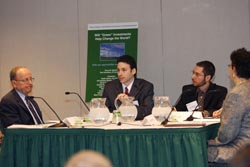Conference promotes 'green' business
 Photo by Joseph V. Labolito/Temple University
At the Third Annual Social Entrepreneurship Conference on April 9, 2008, the panel featured local 'green' business leaders (left to right) Christopher Bentley, Executive Vice President of FuelCell Energy Clayton Lane, Deputy Executive Director, Philly CarShare Ken Rosso, Fox MBA student and co-founder of Fox Net Impact, and Nadia Adawi, President of Philadelphia Fry-o-Diesel.
|
At Temple’s third annual Social Entrepreneurship Conference, organized by the student M.B.A. group Net Impact, environmental and social issues were shown to be not simply political talking points, but also a strong consideration in business practices and investments.
|
|
“In keeping with their commitment to use the power of business to make a positive impact, the Net Impact team really wanted to focus on the interaction between financial markets — business in a nutshell — and global climate change,” said T.L. Hill, managing director of the Enterprise Management Consulting Practice at the Fox School.
For the Fox School of Business |
|